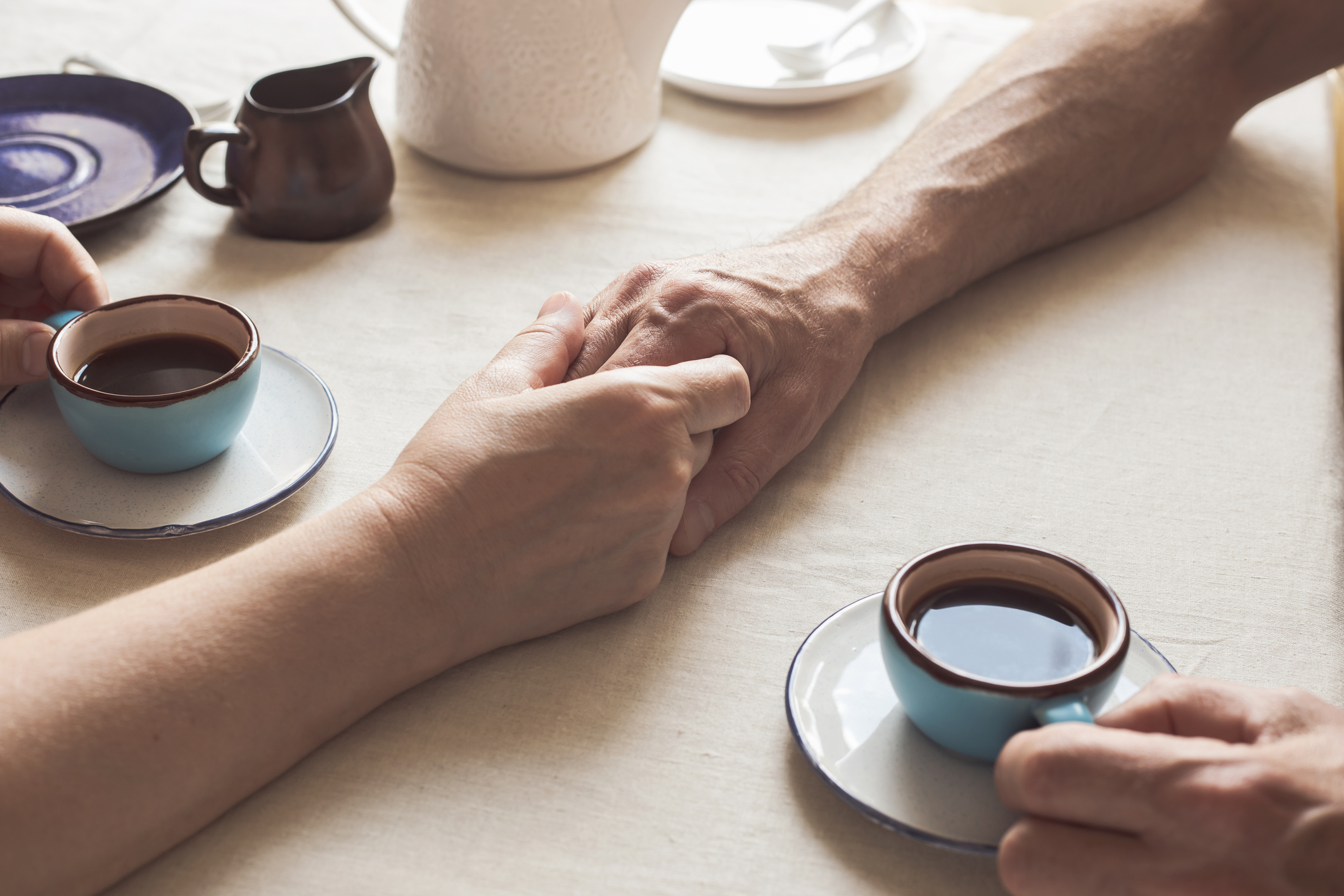Baby loss: Maintaining a relationship with your partner after the death of a child
It's a traumatic time, and will undoubtedly affect your closest relationship...

The baby loss charity Tommy's estimates that there were around 3,200 stillbirths in the UK in 2017, and an estimated 650 miscarried babies each day in the same year.
In fact, the organisation reports that devastatingly,one in four pregnancies ends in miscarriages, and that one in every 225 births ends in a stillbirth in the UK - a heartbreakingly high number.
The emotional blow caused by baby loss is undoubtedly the most difficult emotion any mother or father can go through. But perhaps one of the least-discussed repercussions of baby loss is the impact it can have on relationships and marriages.
Sharing the effects of baby loss trauma, Jenny Agliss, spokesperson at Child Bereavment UK, reports that baby loss can have devastating consequences on a relationship or marriage - whether you've been together for 10 months or 10 years.
Jenny told GoodtoKnow: 'When a baby or child dies it can be incredibly hard for parents to focus on anything else. In fact, the divorce rate among bereaved parents is actually higher than in other parents, according to a Lyngstad study which took place in 2013.'
So why do some couples fall apart in the face of immense loss, rather than come together? Ammanda Major, spokesperson at Relate, and an experienced relationship counsellor, explained that the grief and trauma of baby loss can stop couples communicating properly - or sometimes, at all.
She told us: 'Losing a baby is an incredibly traumatic event. It’s not the natural order of things, and couples often find themselves so engulfed in their own grief, sadness and loss over what might have been, that it becomes a barrier to sharing feelings with their partner.'
GoodtoKnow Newsletter
Parenting advice, hot topics, best buys and family finance tips delivered straight to your inbox.
When both parties are carrying with them the overwhelming grief of baby loss, it's no surprise that it can be difficult to reconnect as a couple, as you try to come to terms with the tragedy.
So how can couples try and rebuild their relationship after baby loss?
Accept your partner's way of grieving - no questions asked
Everyone grieves differently, no matter how similar your personalities may be. Some find it easier to scream, shout, and cry, while others retreat into themselves, preferring quiet and distractions.
Jenny admitted however that these different approaches can be tough to reconcile when you're in the midst of grief.
She said: 'These differences in response to the death of a baby may be misinterpreted by each partner and cause tension. The partner who wants to focus on the loss may seem closed and unwilling to move forward. And the partner who wants to carry on may be seen as uncaring, both to the partner and the baby that has died.'

However, she explains that accepting these differences is a key part of moving forward together - if that is what you want to do: 'By recognising, understanding and accommodating differences in how we grieve, couples can begin to understand that they are both grieving, just in different ways. There is no right or wrong way to grieve.'
Acknowledging that there is no 'correct' way to go about grief is vital if you want to bridge the gap between you and your loved one.
'We are all different and it isn’t about being right or wrong. If this is not understood, irritation, frustration and distancing can result. Understanding that this is normal can enable couples to communicate more effectively and work towards rebuilding their lives together,' Jenny of Child Bereavement UK said.
And sometimes, you may need outside help to start communicating again.
Ammanda suggests that talking things through with a counsellor could help you reach a better place - 'If anyone feels this is what’s happening in their relationship, talking with a bereavement counsellor can be a helpful way of understanding each other and what you both need better.'
Write out in notes, texts or emails, the emotions you may not be able to say out loud
Although Jenny explains that: 'The key to a relationship surviving a loss is to keep talking', some couples feel unable, or may not want, to share their feelings in a conversation. Sometimes, the pain can be too difficult to speak out loud.
Instead, Jenny explained, you could voice your feelings through different mediums. She said, 'Some couples find it easier to write down how they are feeling and share it with their partner - perhaps by sending a text, a letter or card.'
But if you can, speaking to each other when the time feels right is the ideal next step. She continued: 'Try to see things through your partners eyes, give each other permission to talk about your feelings, or even set specific time aside during your week to talk about it, so you can listen to each other and acknowledge how you’re both feeling.

'Try to listen to each other so that you can understand your partner’s pain and sadness, what helps them and how you can support them.
'And try to find out what is important to them. For some, it may be as simple as spending time together, or just having a cuddle; taking time to do things that you enjoy together."
Avoid putting time limits on your grief - or your partners
As everyone who has gone through loss will know, there is no way to speed up the grieving process. It can hit you a month, a year, or 10 years down the line.
So even if you feel like you're ready to begin to move on from the loss, accept that your partner may still want to discuss your shared grief at any point.
Ammanda explains that: 'The loss of a child or baby will always be with the parents. And although it might be difficult, it can be really helpful to talk about the baby together, to share your feelings and let each other know when you need support.
'Grief doesn’t necessarily follow a certain pattern so do what’s right for you and your partner.'
Speak to other people about it, even if it feels like they won't understand
Going through baby loss as a couple is a very personal experience, and it can most feel natural to remain insular, keeping the intimate details of your heartache between only you and your other half. After all, aren't you the only ones who really understand what each other has been through?
But Ammanda confessed that talking to the rest of your loved ones can help with the healing process, and could in turn, take some pressure off of your relationship.
MORE: A guide to adoption: Everything you need to know about the adoption process
She told GTK, "As well as reaching out to your partner, don’t be afraid to ask for help from family and friends and professionals.
"Some couples find that friends and family find it difficult to know what to say and this can sometimes feel as if they’re not interested or don’t care, when actually the opposite may well be true, and their only fear about raising the subject is that it could upset you further.
"If it feels important to talk about the loss, it may help you and your partner to let people know it’s okay to talk to other people about it."
Support each other as you make a return to physical intimacy - and definitely don't force it
The first part of returning to sex after such a huge loss is realising that it won't come instantly, and your intimacy could well be impacted by baby loss.
Ammanda admitted, 'Any trauma or loss is likely to affect intimacy in a relationship.

Child Bereavement UK also explained that there may, understandably so, be a huge fear attached to returning to sex. They said: 'For some couples, sex and intimacy may be too painful for fear of another pregnancy when they are not emotionally mentally or physically ready.
'Others may be focused on being pregnant which again may also bring pressure to a relationship.
But as with everything else, the key is to go at your own pace, and consider one another's feelings beforehand.
Jenny said: 'What helps a relationship is to communicate, slowly doing things that help one another and reaching out in a way that is loving and kind.'
While Ammanda agreed, saying: 'It’s important to feel supported and to take things at a pace that feels right.
'It may also be helpful to remember that intimacy is not just about sex, but can be a wide range of actions, words and attitudes that provide comfort, care and support. For some couples intimacy returns fairly quickly. For others it takes as long as it takes, and that’s okay.'
Child Bereavement UK supports families and trains professionals both when a baby or child of any age dies or is dying, and when a child is facing bereavement. For confidential support, information and guidance to families and professionals throughout the UK our helpline team is available to take calls and respond to emails 9 am – 5 pm, Monday to Friday on 0800 902 888 40 or email: support@childbereavementuk.org
Visit Relate.org.uk for relationship support, and counselling services.
Or, contact them on their telephone counselling booking line on 0300 003 0396.
Amy is Senior Digital Writer across Woman & Home, GoodTo and Woman, writing about everything from celebrity news to health, fashion and beauty features. When she isn't obsessing over the latest dress drop from Marks & Spencer, you'll most likely find Amy out running, or with a cup of tea in hand ready to dive into a gripping new Netflix series.